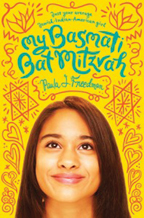“My Basmati Bat Mitzvah” by Paula J. Freedman. (Amulet, 2013)
“Mira in the Present Tense” by Sita Brahmachari. (Whitman, 2013)

 The Pew Research Center’s recent study of intermarriage and Jewish life will resonate with the parents of readers of both these recent books. In each novel the protagonist is a 12-year-old girl who has a Jewish father and a mother of Indian heritage. However, in each book, the manner in which these girls and their families deal with their mixed heritage is entirely different.
The Pew Research Center’s recent study of intermarriage and Jewish life will resonate with the parents of readers of both these recent books. In each novel the protagonist is a 12-year-old girl who has a Jewish father and a mother of Indian heritage. However, in each book, the manner in which these girls and their families deal with their mixed heritage is entirely different.
“My Basmati Bat Mitzvah” is about Tara Feinstein who is studying for her Bat Mitzvah, although she worries that having a Bat Mitzvah will definitively separate her from her Indian culture. Her mother has converted to Judaism, and the rabbi has assured Tara that the ceremony will not make her any less Indian. The novel itself is about blending cultures, putting chilies in the chicken soup, turning a sari into a dress for the Bat Mitzvah, watching Bollywood movies and developing an almost Talmudic relationship with the rabbi. What this book demonstrates is that a blended family can be utterly Jewish without turning its back on another culture. It is a great read for young teenagers.
“Mira in the Present Tense” describes an entirely different kind of intermarriage. It is set primarily in London, and any relation to Jewish religion, culture or history is virtually non-existent. On the other hand, there is a similar lack of relationship to Mira’s Indian heritage. This is a depiction of a totally secular, British family whose main cultural/religious activity is left-wing politics and protest. The novel presents an example of an inter-married family in which the couple does not adopt either of their cultures. The novel itself is a much better written book than “My Basmati Bat Mitzvah.” The author beautifully portrays the angst of a 12-year-old girl who is clearly different from her classmates and a natural target for bullies. Mira’s relationship with her beloved grandmother, who is dying of cancer, is drawn with amazing sensitivity. While the book’s only relationship to the Jewish world is Mira’s last name, Levenson, it is an example of what the Pew research warns about — a total loss of Jewishness. It does, however, portray a lovely family who make a life for themselves literally “in the present tense” with no past to interfere. This book will appeal to readers of all ages.
Andrea Kempf is a retired librarian who speaks throughout the community on various topics related to books and reading.